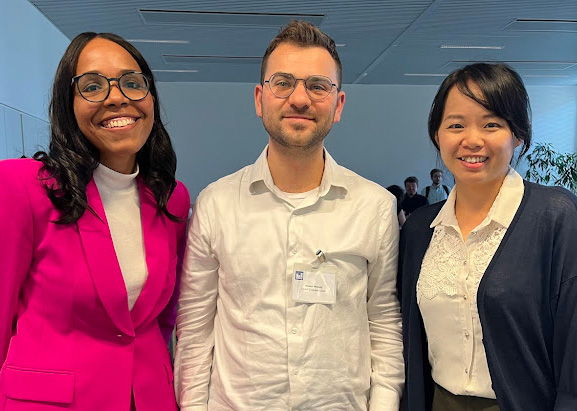July 15, 2024
Three Graduate Center doctoral students received Stone Center scholarships to attend the recent LIS Introductory Summer Workshop in Luxembourg, a one-week intensive course that introduces researchers to two widely used databases used in comparative studies of income and wealth.
The scholarships were awarded to Haydeeliz Carrasco, a Ph.D. student in economics, and to Yu-Jhen Chen and Robert Murphy, Ph.D. students in sociology.
The annual workshop is hosted by LIS, the cross-national data archive, and provides in-depth training in the use of the LIS Database (focused on income microdata) and the LWS Database (focused on wealth microdata). The Stone Center is the home of the U.S. Office of LIS.
In addition to advanced knowledge about methods used in inequality research, the workshop offers connections to the broad international network of scholars who use LIS and LWS data. Nearly 30 Graduate Center students have attended the workshop over the past 16 years.
“As a LIS beginner, I greatly appreciated the expert lectures on the dataset structures, variable concepts, methodologies, and theories behind the LIS dataset,” says Chen. “The hands-on lab sessions were particularly valuable, allowing me to practice using the LIS data under expert guidance. Beyond the coursework, for me, connecting with people from diverse backgrounds who share an interest in inequality studies was an invaluable experience.”
Chen’s research focuses on immigrant inequality, particularly within the context of social security and on the experiences of late immigrants to the U.S. “The insights gained from the LIS workshop, especially regarding the use of immigrant and pension variables, have inspired me to expand my research to explore late immigrant issues across different countries,” she says. “The methodologies and data handling techniques I learned will be extremely helpful in conducting comprehensive cross-national analyses I plan to conduct in my future studies, contributing to a broader understanding of immigrant inequality.”
One of the first sessions at the workshop featured a presentation by Janet Gornick, the director of the GC Stone Center, on the use of LIS data for sociological, political, and policy research. From 2006 to 2016, Gornick served as the director of LIS. Stone Center Affiliated Scholar Philippe Van Kerm also presented at the workshop, focusing on inequalities at the center and at the extremes of the distribution.
Carrasco has developed tax-benefit microsimulation models to analyze the impact of taxes and transfers on poverty and inequality in developing countries using national household socio-economic surveys. Her current work focuses on how public policies affect socio-economic mobility and income class dynamics. “The LIS and LWS harmonized databases will help me explore some of my research questions by comparing trends across countries (both developing and developed) and over time,” she says.
Learning directly from contributing researchers and scholars was one of the most valuable aspects of the workshop, Carrasco says. “The LIS team explained the data harmonization in the LIS and LWS income and wealth databases and led programming sessions on the LISSY interface,” she says. LISSY allows researchers to access LIS and LWS microdata remotely while respecting privacy regulations. “I was thrilled to learn from Professor Philippe Van Kerm and Professor Louis Chauvel, who have developed methods for inequality decomposition analysis and middle-income class dynamics, respectively.”



